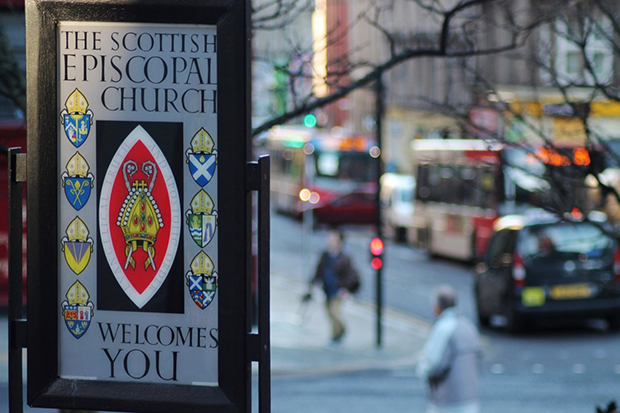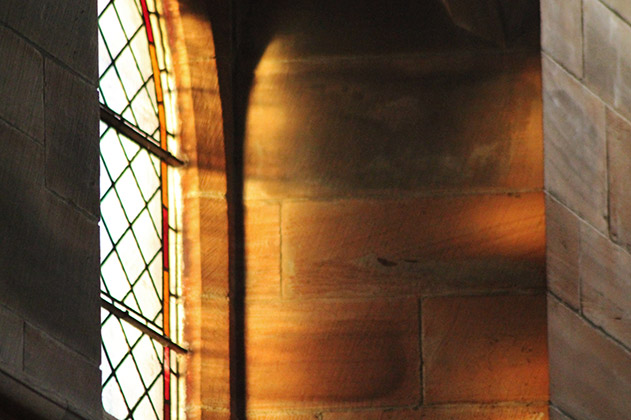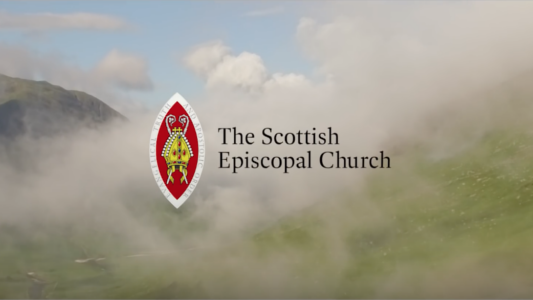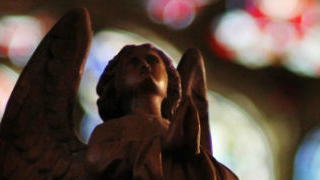1. Introduction
1.1 What are archives and why should we keep them?
Archives are the papers and other artefacts which record the history of a congregation – in addition to Registers, [note 1] congregational archives include some or all of current and previous versions of the Constitution, Congregational Rolls, [note 2] Minutes of Vestry and Congregational Meetings, Annual Accounts, Inventories, copies of the Annual Congregational Return and the annual Diocesan Schedule, Quinquennial Inspection Reports, record of burials if there is a graveyard, correspondence of lasting value and interest, congregational magazines or newsletters, photographs, newspaper reports, video tapes or films of congregational events, and other items of historical value.
Deeds of consecration of churches, and title deeds for the church buildings, clergy house(s) and any other property, and copies of Constitutions and Inventories should be deposited with the Diocesan Registrar, [note 3] but copies may be kept with congregational archives.
1.2 What are not archives?
Much correspondence need only be kept while the subject matter is current, but care should be taken not to destroy material which might be of interest to a historian in the future. Some items, e.g. receipts for routine transactions, cash books, FWO records, need only be kept for the periods required by law, after which they can be shredded. [note 4]
2. Keeping records and archives [note 5]
2.1 Appointing an Archives Officer
The Vestry may find it helpful to nominate a suitable person to look after the congregation’s archives, and to report to the Vestry from time to time.
2.2 Current records
Normally it is convenient to keep current Registers in the Vestry safe or cupboard.
The Cleric-in-Charge, the Secretary to the Vestry, the Treasurer, and possibly other officials, may have to keep Minute Books, Cash Books and some other current files in their own office or at home to carry out their duties. However, the number of documents retained in this way should be kept to a minimum, and all ‘closed’ Minute Books, Account Books etc. should be placed with other archives. When a cleric or lay official retires or resigns, all church records and papers must be handed over to his/her successor, or to another appropriate person for safe keeping.
2.3 Storing archives
All archives, including closed Registers, should be kept securely and safely, under lock and key. The possibility of theft, and damage, for example by fire, water or vermin, should be minimised. Storage in wooden buildings, under flat roofs, in attics or basements, near water pipes, tanks or radiators, near electrical and gas installations and appliances, beside windows and skylights should all be avoided. A carbon dioxide fire extinguisher should be kept nearby, as advised by the local fire brigade.
Papers and other archives should be stored in acid-free archive boxes if possible. [note 6] These boxes should be stored in wooden containers or cupboards, kept at least 6 inches above the floor. Metal or cardboard-only containers should not be used as both are susceptible to water damage. Good ventilation and a consistent moderate temperature are essential.
2.4 Record of archives
A list of the documents in the archive should be drawn up and kept up to date. One copy should be kept with the archives and one other copy kept securely elsewhere. It would be helpful if a copy were sent to the Provincial (or Diocesan) Records Officer. [note 7] A survey of archives held by congregations in the Scottish Episcopal Church was undertaken between 1989 and 1992 on behalf of the National Register of Archives (Scotland) [NRAS]. This record may be found on the NRAS website [http://www.nrscotland.gov.uk/nras/register.asp].
2.5 Access to archives
Access to archives for research or other purposes should generally be granted if the researcher has adequate references, and is suitably qualified and experienced. All persons given access should be supervised to ensure that no documents or other items are removed, marked or damaged in any way. Pens, corrector fluid, erasures, food and drink, and sticky tape should not used on or near the archives. Only pencils should be used to take notes with and archives should not be folded or leant upon.
To comply with the Data Protection Act 1998, data about a living individual must not be disclosed to a third party without the individual’s consent. [note 8] Free access should never be allowed to current and recent Registers of Baptisms, Confirmations and Marriages, and care must be taken in providing information from these records until it is known or can be assumed with good reason that the individual has died.
2.6 Exhibiting archives
With due consideration for preservation, the most interesting archives should be shared with the rest of the congregation and visitors, if not by putting them on permanent display, at least on occasions like the annual ‘Doors Open Days’. Original items should not be exhibited, however, for fear of damage, theft or loss. Copies should be made, but by taking photographs with film or digital cameras under suitable conditions without flash – not by photocopying, which can cause irreparable damage.
3. Disasters
Sometimes, despite all precautions, disasters happen. Advice should be studied in advance, and if the worst happens, assistance should be sought immediately from a professional archivist in the local authority or university archive, or the Provincial Records Officer. An up-to-date list of vital records (i.e. the records needed in order to carry out the day-to-day business of the church), as well as electronic copies of vital records should be kept securely in a separate location.
4. Depositing archives
Clergy and Vestries are encouraged to deposit non-current Registers and other congregational archives over at least 30 years old with an appropriate local authority or university Archive, which is willing and able to receive them. Some congregations have done so. The proposed Archive should be visited to ensure that care of the archives would be adequate, and the archive staff should be contacted to ensure that they are in a position to receive the deposit. When archives are deposited, ownership remains with the Vestry, who have the right to withdraw the material when they wish. A major advantage of deposit is that the archives are kept in more suitable conditions for long-term storage than may be available on church premises. The Archivist concerned may sort and list documents, and may undertake necessary repairs, but might claim reimbursement for any costs incurred if archives were withdrawn later. Although the Archive’s normal rules about public access would apply, the Vestry might be able to agree special conditions about access to the more recent records referring to individuals. [note 9] Contact details of Archives will be found under the Council’s or University’s entry in the telephone directory, or may be obtained from NRAS, or the Provincial (or Diocesan) Records Officer.
It would be helpful it the Provincial and Diocesan Records Officers were informed about past and future deposits of congregational archives in any public Archive and if any exist, copies of deposit agreements or correspondence regarding deposit to be sent to them.
A review should be undertaken by the Vestry every ten years or so, to consider if any further documents should be deposited in the Archive.
5. Electronic Records
Although older records and archives are on paper, increasingly current congregational records are being created on computers. Un-compressed back up copies of all significant data should be made regularly and kept separately from originals. Care should be taken to use a storage method likely to be readable long term; changes in the future will require the transfer of archived material to a new format. Consequently, it is recommended that well-known file formats are used and that the number of different formats is kept to a minimum. [note 10] Information, such as the file names in which the data is kept, file version, file formats, the date of creation and date of transfer, should be kept as metadata in the electronic version of the file and on paper in order to manage this process. Discs and other removable memory devices should be kept securely and labelled.
Provided no information is lost when printed, some documents of permanent value can be kept on paper and stored as archives. For such records, good quality acid-free paper and a high quality laser printer should be used. Metal staples or paper clips should not be used as they are susceptible to rust.
6. Provincial Records Officer and Diocesan Records Advisors
The Provincial Records Officer is appointed by the Standing Committee of General Synod to encourage the proper maintenance and preservation of archives at parochial, diocesan and provincial level, and to work with any Diocesan Advisors appointed by the Bishops to deal with such matters in their dioceses. He/she is responsible to the Secretary General. In addition the Provincial Records Advisor deals with enquiries about archival material, and liaises as necessary with NRAS and local Archivists. From time to time seminars about the care of archives may be arranged.
The Provincial Records Advisor may be contacted through the General Synod Office, and any Diocesan Records Advisors through Diocesan Offices.
2007 (updated 2022)
The General Synod of the Scottish Episcopal Church does not accept responsibility for any loss or liability which may arise from reliance on information or expressions of opinion contained in this document.
General Synod of the Scottish Episcopal Church
Scottish Charity No SC015962 5
Footnotes
- Canon 42 Of Church Registers refers to ‘Registers of Baptisms, Confirmations, Marriages and Funerals and a register of the number of persons who have communicated publicly or privately on each separate occasion’
- See Canon 41 Of Communicants’ and Other Rolls
- See Canon 61 Of Diocesan Officials Resolution 5
- For a helpful list of how long to keep records of all sorts, see ‘Keep or Bin…?’ Section 7 ‘Retention Guidelines’, details of which are printed in the Appendix.
- Further detailed advice about the topics in this Section will be found in the books listed in the Appendix.
- For advice and list of suppliers please contact the Provincial Records Officer.
- See Section 6.
- See guidance on data protection available from the SEC website
- See Section 2.5 above.
- For advice please contact the Provincial Records Officer.
APPENDIX
FURTHER INFORMATION
Further information is available in the following publications, to which reference was made in the preparation of these Guidelines. The advice of members of the Administration Board is also acknowledged.
1. ‘Archive Preservation Guidelines for Private Owners’, seventh edition, September 2005, contains a great deal of helpful advice. It is published by and available from the National Register of Archives for Scotland, (a branch of the National Records of Scotland, formerly the Scottish Record Office), whose address is:
HM General Register House
Princes Street
Edinburgh EH1 3YY
Telephone 0131 535 1403/1405/1428 Fax 0131 535 1430
Email lsrhe@scotlandspeople.gov.uk. Website www.nrscotland.gov.uk
Details of local authority and university Archives can be found on the website of the Scottish Archive Network www.scan.org.uk
Details of church archives held by Universities can be found on their own websites, or on the Archives Hub website www.archiveshub.ac.uk
Although written for the Church of England, three other relevant publications are the following, the first being particularly useful –
2. ‘Keep or bin..? The care of your Parish Records’, 2007, Church of England Record Centre; this can be downloaded at https://www.churchofengland.org/sites/default/files/2017-11/care_of_parish_records_keep_or_bin_-_2009_edition.pdf
3. ‘Guide to the Parochial Registers and Records Measure’, April 1978, CIO Publishing: out of print, but a copy might be obtainable from a contact in the Church of England.
4. ‘Practical Church Management’ by James Behrens, Greenwing, 2020.







